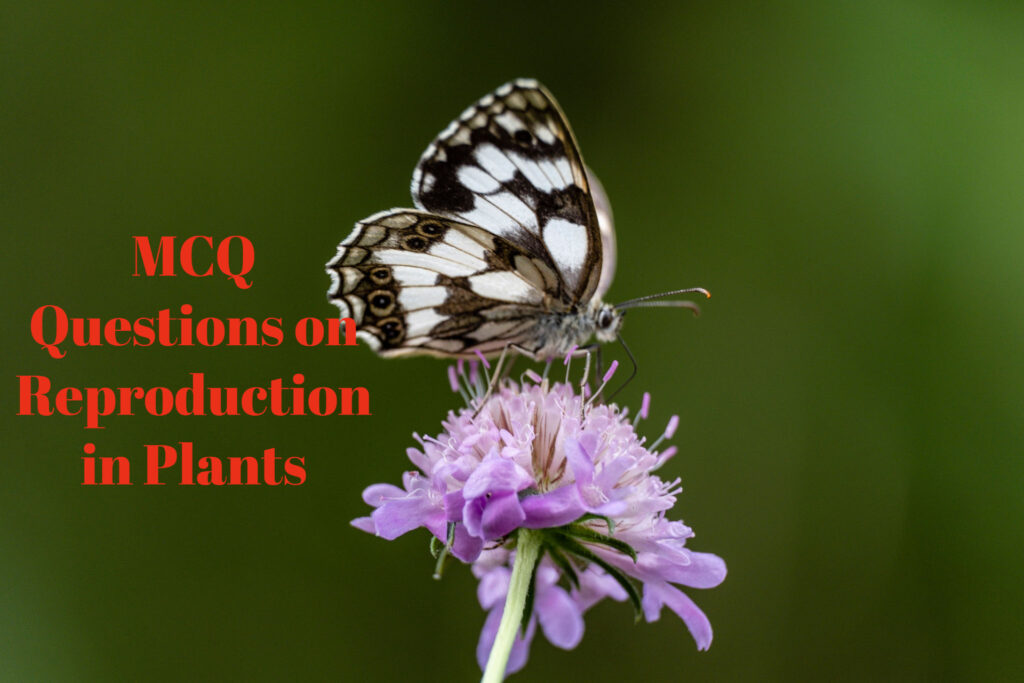Hello Readers! I hope that all of you are doing fine. I am here with a lot of Multiple-Choice Questions on Reproduction in Plants. While going through the Objective-type questions on Reproduction in Plants, you will come across some important Facts about Plants, which are pretty interesting. Let’s enjoy ourselves by gaining more knowledge!
Further for getting the PDF version of this MCQ sheet in hand, click on the PDF downloadable button that you will get at the end of this article.

If you have not yet visited the “MCQ Questions on Pollination”, please click the following link and solve the quiz.
MCQ Questions on Reproduction in Plants For Class 5
Here are some MCQ questions on Reproduction in Plants:
- In how many different ways, can plants reproduce new plants?
- 4
- 3
- 2
- 1
Ans: (3)
- In which type of reproduction, male and female both gametes are required?
- Sexual reproduction
- Mono sexual reproduction
- Both (1) and (2)
- Asexual reproduction
Ans: (3)
- In which type of reproduction, male, and female both gametes are not required?
- Sexual reproduction
- Mono sexual reproduction
- Both (1) and (2)
- Asexual reproduction
Ans: (4)
- Here are the steps for reproduction:
- Formation of fruit
- Pollination
- Fertilization
- Formation of seed
Choose the correct sequences for reproduction-
- d-c-b-a
- a-b-c-d
- b-c-a-d
- c-b-a-d
Ans: (3)
- Which of the following is known as vegetative reproduction?
- Sexual reproduction
- Asexual reproduction
- Bisexual reproduction
- Mono sexual reproduction
Ans: (2)
- What is fertilisation?
- The process leads to the formation of seeds that later germinates into a new plant.
- The fusion of male gamete with female gamete.
- The process of transfer of pollen grains from the anther to the stigma.
- Both (1) and (2)
Ans: (4)
- Which process leads to the formation of seeds?
- Pollination
- Reproduction
- Fertilization
- None of these
Ans: (3)
- The pollen tube grows:
- Upward into the style
- Downward into the style
- Upward into the filament
- Downward into the filament
Ans: (2)
- When does a pollen tube develop?
- Before fertilization
- Before pollen grain reaches the stigma
- During germination when pollen grain reaches the stigma
- Before pollination
Ans: (3)
- Pollen tube develops within the:
- Stamens
- Carpels
- Sepals
- Anther
Ans: (2)
- The egg cell is present in the:
- Stigma
- Anther
- Ovary
- Filament
Ans: (3)
- The baby plant is known as:
- Seedling
- Cotyledons
- Seed coat
- Baby shoot
Ans: (1)
- Which of the following contains one or multiple carpels?
- Stamen
- Pistil
- Stigma
- Filament
Ans: (2)
- Between which two parts of the plant, an embryo is found.
- Seedling
- Dandelion
- Cotyledons
- Stigma
Ans: (3)
- The features of the seed which are dispersed through wind/air:
- It grows near water
- They are light and small
- They have hook-like structures
- All of the above
Ans: (2)
- In which of the following plants, seed dispersal occurs through animals?
- Coconut, Lotus
- Drumstick, Maple
- Xanthium
- None of these
Ans: (3)
- Single-cell produced as a result of fertilization are known as:
- Pollen
- Zygote
- Pericarp
- Seed
Ans: (2)
- Which of the following process occurs first?
- Pollination
- Fertilization
- Seed Dispersal
- Embryo formation
Ans: (1)
- Ovules, after fertilization, are converted into-
- Fruit
- Flower
- Seed
- Seedling
Ans: (3)
- Stigma, style, and Ovary all together construct the:
- Seed
- Embryo
- Pistil
- None of these
Ans: (3)
- The purpose of fertilization is:
- Reproduction
- Fusion
- Formation of flowers
- All of the above
Ans: (1)
- Non-flowering plants have special structures in their leaves, called _.
- Buds
- Spores
- Ovules
- Seeds
Ans: (2)
- Which of the following plant has buds on the margins of the leaves?
- Bryophyllum
- Ginger
- Dahlia
- Carrot
Ans: (1)
- Sori is found in:
- Bryophyllum
- Fern
- Dahlia
- Carrot
Ans: (2)
Quiz on Reproduction in Plants
Here is the quiz for you. Please don’t miss in participating the Quiz on Reproduction in Plants.
I hope, all the kids have enjoyed the quiz.
Worksheet on Reproduction in Plant (Full marks – 40)
Fill in the blanks: (1×10=10)
- The purpose of fertilization is _.
- The fusion of male gametes into female gametes is known as _.
- Three numbers pollination agents are _,_, and _.
- After diffusion of pollens into ovules _ is formed.
- The first step of plant reproduction is _.
- Female eggs are known as_.
- Male gametes are known as _.
- _ is the sticky part to which pollen grains are attached.
Ans: Reproduction, Fertilization, Wind, Insects and Water, Zygote, Pollination, Ovules, Pollens, Stigma
Answer the following questions. (30)
- What happens to the flowers after fertilization? (2)
- What will happen If all the seeds fall and start growing beneath the parent plant? (2)
- Name the agents of the dispersal of seeds. (2)
- Name the different parts of the female reproductive organ of a plant with a suitable diagram. (2)
- Name the different parts of the male reproductive organ of a plant with a suitable diagram. (2)
- Define Vegetative Reproduction. (2)
- Draw a diagram of a flower and label all the reproductive parts. (2)
- Define fertilization and describe its’ types. (2)
- Describe the dispersal of seeds through water and air. (2)
- How do new plants grow from stem cuttings? Explain with suitable examples. (2)
- What is Spores? What is Sori? In which plants these are found? What is the function of these? (1+1+2+1)
- Give some examples where the plants grow from the cutting stems and leaves. (2+1)
- Give some examples where seed dispersal occurs through the explosion. (2)
Conclusion
I hope that all of you have enjoyed the article on Multiple-Choice Questions on Reproduction in Plants. This will surely help you in achieving a high score in your school examination / competitive examination. After completing the worksheet, ask your parents/tutor to put the marks and then please write your marks of the worksheet and the quiz in the comment box. Wish you all the best!


